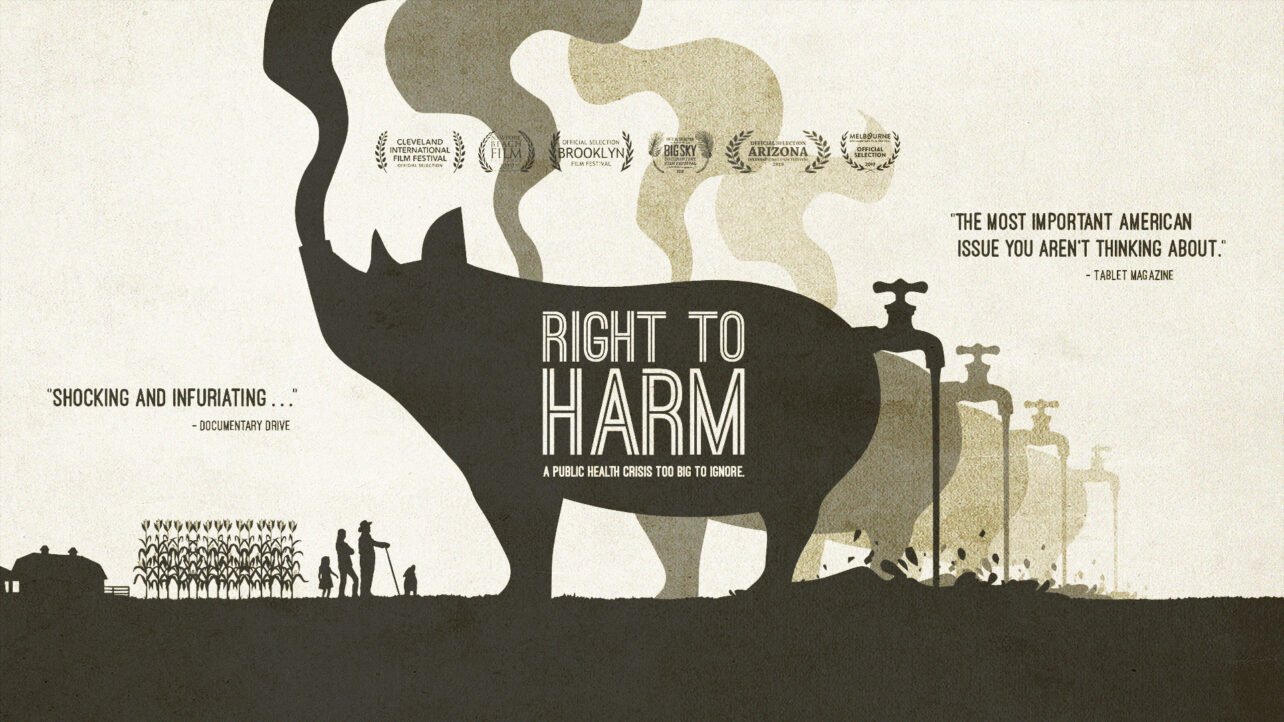Share
FOR IMMEDIATE RELEASE
For More Information Contact:
Karen Hudson
309-208-8846, karenh@sraproject.org
Right to Harm Documents the Public Health and Societal Impacts of Factory Farms
A crowd from across Illinois and beyond flocked to the Midwest premiere of Right to Harm, the new documentary by filmmakers Matt Wechsler and Annie Spiecher (SUSTAINABLE) on Wednesday, March 27 at the Peoria Riverfront Museum. Several individuals from the film, including widely respected agricultural economist Dr. John Ikerd, joined Wechsler for a panel discussion after the screening.
Right to Harm exposes the public health and social impacts of concentrated animal feeding operations (CAFOs), also known as factory farms, on rural communities across the United States. Wechsler and Speicher, an award-winning documentary husband and wife team, focused on the tribulations and triumphs of five rural communities, victims of the past 50 years of agricultural consolidation and consequential laws governing industrial livestock production.
Farmers, mothers, scientists, and politicians from Wisconsin, Iowa, Arizona, North Carolina, and Delmarva shared intimate stories of how their lives were forever changed by their forced encounters with factory farms.
The documentary, backed by noted journalist and Executive Producer Mark Bittman among others, also exposed the failures of state agencies to regulate industrial animal agriculture and chronicled actions taken by disenfranchised citizens to demand justice from their legislators.
A thought-provoking panel discussion following the screening addressed several issues Right to Harm raises. Joining Director Matt Wechsler were two individuals appearing in the film: Dr. John Ikerd, Professor Emeritus, University of Missouri, and Diane Rosenberg, President and Executive Director of Jefferson County Farmers & Neighbors, Inc. and Iowa Consultant with Socially Responsible Agriculture Project.
Illinois resident Thad King, from Sunset Acres Organic Farm, a local community group opposing a 5,000-head hog confinement in Adams County, Illinois, also joined the panel moderated by Karen Hudson, Director of Iowa Citizens for Clean Air and Water and Consultant with the Socially Responsible Agriculture Project.
Dr. Ikerd, a sought after expert on industrial agriculture, addressed the claim that opponents of CAFOs want to eliminate animal agriculture altogether.
“Right to Harm is not about opposition to animal agriculture. Instead, it exposes CAFOs or factory farms as a real threat to the future of animal agriculture because they threaten public health and the well-being of neighbors, rural communities, and society as a whole. No one has a moral right to benefit economically at the expense of other people’s quality of life. The film also reveals positive alternatives for the future of animal agriculture.”
King expressed his frustration with how the Illinois Department of Agriculture handled the permitting process for the 5,000-head confinement in Adams County, a facility that will have a significant impact on his family’s health.
“We met with the top officials at the IDOA to voice our concerns on how laws were not being followed and the impact this will have on the community. Only time will tell if the leaders truly understand the impact of this situation and how key failures for this citing can make a huge impact to a case and to the lives of those who live in a community. For the public’s interest, they have the power and the ability to make this right.”
The problem in neighboring Iowa is massive, said Rosenberg, who cited 22 million hogs, 14,000 factory farms, and 750 polluted waterways in that state. However, she spoke of efforts to staunch the expansion of CAFOs by the Iowa Alliance for Responsible Agriculture (IARA), a coalition of 31 organizations that she co-founded.
“IARA advocates for a factory farm moratorium. Iowans are fed up with the CAFO stench, the lack of community rights, and our filthy waterways. A moratorium bill introduced last year is steadily gaining legislative support because people are speaking out more than ever. It will take time, but the industry is not sustainable the way it’s currently operating.”
Wechsler, who spent three years working on Right to Harmspoke on how he was affected by the situations and stories of the people he portrayed.
“Once you learn what it’s like for people who live near these facilities and then experience it firsthand, you can’t go back. I can’t bring myself to support a system that is inherently inequitable, and I wanted to share that feeling with others.”
The screening of Right to Harm was sponsored by Hourglass Films, Iowa Citizens for Clean Air and Water, and the Socially Responsible Agriculture Project. Right to Harm premiered at the Big Sky Documentary Film Festival in February. Communities can request screenings by visiting righttoharm.film
ABOUT THE EVENT HOSTS:
Illinois Citizens for Clean Air & Water (ICCAW) is a statewide coalition of family farmers and community groups advocating for sensible policies and practices that promote responsible livestock production and protect the environment, public health, and rural quality of life. www.iccaw.org .
Socially Responsible Agriculture Project (SRAP) is a national organization that informs and educates the general public about the negative effects of concentrated animal feeding operations (CAFOs) and works directly with communities across the country to protect their public health, environmental quality, natural resources, and local economies from the damaging impacts of factory farms. sraproject.org.
Hourglass Films is a Midwest based film company dedicated to inspiring change in the heartland of the United States. Its stories focus on social and environmental injustice as well as the sustainability of our planet. The company seeks to provide perspective on political issues by exploring characters rarely seen in the media. www.hourglassfilms.com.

